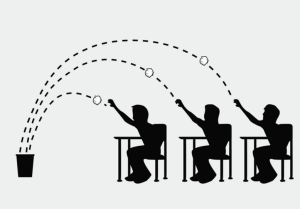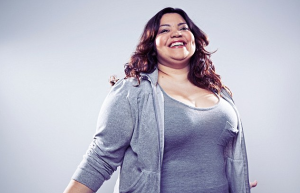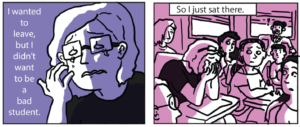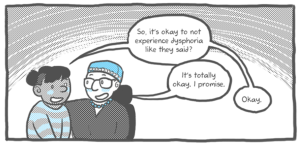When I landed my first-ever full-time, salaried job, I experienced firsthand what class mobility felt like. Just like that – in what felt like an instant – everything changed.
I could finally go out to happy hour without counting my drinks. I could budget to buy really good gifts for my family during the holidays. I could afford to buy fresh produce every week at the grocery store.
But I never stopped being aware of how different life had been when I was underemployed, underpaid, overworked, and stretched for cash.
Class privilege can show up in really big, visible ways in our world.
Folks with money have access to every institution and organization they dream of, whereas some of us have to work full-time to get through school or can’t enroll at all. Families with bigger budgets can afford to live in neighborhoods their local government gives a damn about.
And while some of us are scraping by to pay our taxes, our rent, and our bills, other folks are busy packing for vacations, investing in opening up their dream businesses, or entering into a salient retirement.
None of that is fair.
But class privilege is about a lot more than big-ticket items, political sound bites, and the divide between the folks who send their kids to private schools and those of us who worked as their nannies.
Sometimes, class privilege is about the small, everyday things we often take for granted.
Earlier this year, I explored the ways poverty impacts everyday lives. This time around, let’s flip the script and examine how class privilege shapes our everyday lives, too – whether we’re living in the lap of luxury or just making enough to get by.
If you’ve done these 6 activities recently, you’ve got some class privilege to deal with.
And that’s okay! It’s just important to be aware of it and understand how that impacts your life.
1. You Woke Up Well Rested
I had a routine when I was working full-time that netted me six to eight hours of sleep each night.
I did side jobs that kept me up occasionally, but they were passion projects – and when I really needed to, I extended my deadlines or asked for help in order to make sure I was waking up well-rested in the mornings.
But for some people, sleep is a luxury – and data shows that folks who are disadvantaged socioeconomically are likely to suffer more from sleep deprivation.
External elements commonly associated with poverty – including neighborhood unrest, poor temperature control in the house, and high levels of stress – make it hard to get good shut-eye.
And there’s also a correlation between working more and sleeping less, which means people who put in longer hours or work two or three jobs to make ends meet are less likely to get the quality rest they need between shifts.
Sleeping well every night isn’t just good for us in the short-term. Sure, being awake and coherent at work is important. But our bodies also need sleep – and sufficient, quality bouts of it – to function and stay healthy.
I put in my share of all-nighters when I was working in a 9-to-5, and I know lots of people in similar jobs across sectors aren’t always waking up feeling refreshed and ready to take on the day.
I’m not saying everyone with a full-time job is going to feel like they get enough sleep.
I’m just saying: When it comes to sleep as a matter of survival, there’s a good chance people with class privilege are getting more of it.
2. You Paid for Convenience
You’re running late, so you scrap your plan to make coffee and run to Starbucks instead. You’re working late hours, so you pay a little extra for Instacart delivery to grab groceries for dinner. You’re applying for jobs and going to interviews, so you hire a sitter. It’s late and you’re hungry, so you order take-out.
The ability to choose convenience – even in moderation – despite its added costs is very common in our culture.
Nobody thinks it’s gaudy to be seen with a pizza box, and people aren’t going to be shocked and awed by the fact that you hire a nanny for the weekends. These are seen as normal, everyday choices.
But for lots of folks, they’re experiences that are financially out of reach.
Most parents earning minimum wage or working in other low-wage jobs can’t afford child care. Some folks budget so tightly that even that $2.50 iced coffee will break the bank. And close to 50 million Americans are food insecure.
For folks who are pressed for cash or come from poverty, going the extra mile is par for the course of making it through the day.
For those people, outsourcing some of the more time-consuming or prohibitive tasks in our everyday lives simply isn’t an option – and neither is choosing convenience over cold, hard cash.
3. You Called in Sick
For a lot of full-time, salaried workers, calling in sick is a matter of picking up the phone.
The only decision to make in the morning is whether or not we feel good enough to do our jobs (and how many sick days we have left for the year).
Waking up with a headache, having killer cramps, or catching a virus from your kids means staying home with some soup, opening up Netflix, and laying in bed until we get better.
But for some workers, waking up sick means going to work sick.
Over a third of American workers don’t get paid sick days, and that means over a third of American workers have to choose between feeling better faster and making ends meet when they wake up under the weather.
When I was working part-time to make rent after graduation, I had to find someone to cover me before I was even able to call in sick – and once I did, they got my hourly pay in my stead.
It’s easy to see how someone in a job like mine who was responsible for taking care of their kids, making payments on their car loan on time, or even paying the bills might choose to go into work instead of reconfiguring their budget just because of a common cold.
A fight is currently raging on to extend paid sick leave to all American workers. But until that happens, working (only) while healthy will remain a class privilege.
4. You Used Your Car or Took Reliable Public Transit
I recently moved out to Los Angeles, where I drive my own car around like a fancy pants to do errands, go to meetings, and buy In-N-Out.
Before that, I lived in different neighborhoods across DC, each with relatively good access to metro and bus lines for getting to work and school, going out at night, and getting to and from brunch.
In both of these cities, my experiences are “the norm.”
People in major cities on the East Coast tend to rely on public transit with an okay success rate, and people out here in LA would be quick to tell you that having a car isn’t just optional – it’s optimal.
But in both of these cities, there are people who can’t afford to live that norm. And they’re not alone on either coast.
For many poor people in America, reliable transportation isn’t easy to come by.
Welfare recipients often struggle to find consistent ways to get to and from work, which only serves to continue the cycle of poverty by making work hard to find.
And it goes without much explanation that people struggling to get by probably don’t own reliable cars, buy bus passes on the regular, or spring for taxi fare when they’ve got somewhere to go.
That’s a big deal, and it comes with big consequences.
Not having access to public transit means it’s hard to get to the doctor, the grocery store, or even school and work. Not owning a car can mean the same, and often to a greater extent for folks in rural and suburban areas.
Transportation literally gives us mobility – especially in an economic sense. It opens up opportunities, helps us stay afloat and connected, and prevents us from becoming isolated and desolate.
And across the country, some of the most socioeconomically disadvantaged people have trouble getting around.
5. You Got Paid for All Your Hours at Work
Luckily, most of us can reasonably count on being paid on time and at the rate we agreed on.
But many people can’t be sure they’ll ever see their pay for a day’s work.
Across the country, workers are dealing with wage theft, which means they’re not being paid for the hours they worked in full.
Data suggests that wage theft is widespread, and it’s reported in all regions of the US. And workers who miss out on fair compensation are losing billions.
Many of them are also low-wage earners, meaning an instance of wage theft could make them late in paying the bills or make it hard for them to put food on the table.
For those workers, wage theft is only a small part of their marginalization as workers. Some folks who suffer from wage theft are undocumented, or lack the backing of a union or state labor laws.
Even though withholding pay is illegal across the country, workers who don’t get paid on-time and fairly often have no recourse.
Part-time workers and hourly workers are often the kinds of laborers who count on their paychecks the most.
They’re not in positions where their employers are required to give them benefits, and they’re likely earning less than their full-time counterparts or folks in different jobs and different sectors.
When they lose a paycheck, or their boss withholds pay for that overtime they worked last weekend, they may ultimately have to choose between a warm dinner on the table and paying the bills.
A wise man once said, “Work sucks, I know.” And it’s true!
We don’t all feel like we get paid enough or are given enough opportunities to advance, and many of us aren’t. But if you can count on getting paid and getting paid enough at the end of the work week, consider it a privilege.
6. You Bought Fresh, Healthy Food at the Grocery Store
There are a lot of groceries stores in my neighborhood, and all of them carry fresh produce.
I can head out a few minutes in either direction and find veggies and fruit that fit in my weekly budget, and then I get to go home and prepare well-balanced meals that fulfill my nutritional (and also just general foodie) needs without much hassle.
And I’m damn lucky, y’all.
‘Cause even if I eat a lot of beans and fifty-cent avocados, I’m still able to fuel myself in relatively healthy and affordable ways. And that’s a privilege.
It’s a privilege to live somewhere in short reach of fresh food. And it’s a privilege to be able to afford it.
Some of the poorest people in America either can’t afford groceries or can’t find healthy ones.
Most “food deserts” – areas of the US where fresh produce is nearly impossible to find – are also impoverished areas.
And in areas where fresh and healthy food is available, people living on tight budgets or in poverty often have to opt to buy cheaper, more unhealthy options.
These two reasons have created health epidemics in poorer communities, and they’re just two of the many reasons why we can’t judge poor people’s food choices.
Class privilege doesn’t always look like caviar on a private jet or a ten-course meal uptown. Sometimes, it just looks like an apple a day and some hot veggies at night.
***
I’m not a big fan of the “Oppression Olympics.”
I’m not here to say that my experiences are or have been any harder than yours. I’m not even here to tell you that you should feel bad for ordering that pizza, or guilty about your reliable job.
But I do think it’s important for us to recognize our own privileges. And I think challenging ourselves to see small-scale economic privilege helps clarify the fight for economic justice.
When we boil class issues down to the 1% and the 99%, we’re missing out on a lot of opportunities to spotlight where economic oppression and difference shapes everyone’s lives.
Economic equality is about a lot more than smashing capitalism and bringing down the banks and even equal pay for women.
It’s about recognizing that even the smallest differences between our socioeconomic places in this society can make a big difference in how we survive our time in it.
[do_widget id=’text-101′]
Carmen Rios is a Contributing Writer for Everyday Feminism. She splits her time disparately between feminist rabble-rousing, writing, public speaking, and flower-picking. A professional feminist by day and overemotional writer by night, Carmen is currently Communications Coordinator at the Feminist Majority Foundation and the Feminism and Community Editor at Autostraddle. You can follow her on Twitter @carmenriosss and Tumblr to learn more about her feelings.
Search our 3000+ articles!
Read our articles about:
Our online racial justice training
Used by hundreds of universities, non-profits, and businesses.
Click to learn more





















